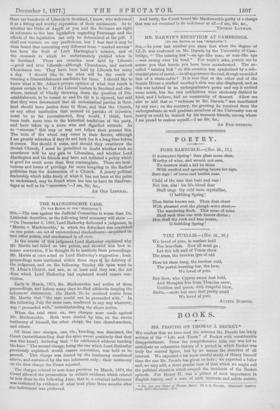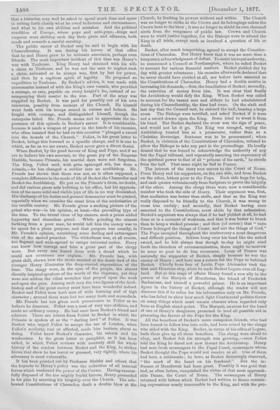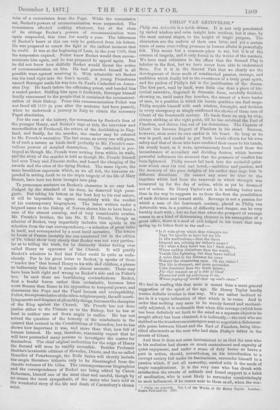BOOKS.
MR. FROUDE ON THOMAS A. BECKE'T.*
WE confess that we have read the account Mr. Fronde has lately written of the "Life and Times " of Becket with considerable disappointment. From the comprehensive title, one was led to anticipate an exhaustive history of a period in which Becket was truly the central figure, but by no means the absorber of all interest. We expected a far more careful study of Henry himself than the one Mr. Froude has given us here ; we expected a fuller and, we may add, a more precise view of that which we might call the political situation which swayed the incidents of the Becket episode. For Henry II. was a prince of such importance in English history, and a man of such intricate and subtle nature, * The Life and Times of Thomas Bad. By J. A. Fronde. AneemEh Ceingurg Juno, 1877—NOvember, 1877.
that a historian may well be asked to spend much time and space in setting forth clearly what he owed to fortune and circumstance, and what to his own abilities and mistakes. And the political condition of Europe, where pope and anti-pope, .kings and emperor were shifting each day their plots and alliances, both needs and rewards a careful scrutiny.
The public career of Becket may be said to begin with his Chancellorship. It was during his tenure of that office that he and Henry grew to be intimate associates, perhaps even friends. The most important incident of this time was Henry's war with Toulouse. King Henry had obtained with his wife a claim to Toulouse, and he was not the man to neglect such a claim, animated as he always was, first by lust for power, and then by a captious spirit of legality. He proposed an expedition to Toulouse. By Becket's advice, it was made with mercenaries instead of with the King's own vassals, who provided
scutage, or rate, payable on every knight's fee, instead of ac- companying their master to the war. Part of the army was supplied by Becket. It was paid for possibly out of his own resources, possibly from moneys of the Church. He himself went forth with his troops armed in cuirass and helmet. He fought with courage, and distinguished himself, though the enterprise failed. Mr. Fronde seems not to appreciate the im- portance of this episode in Becket's career. It is considerable, because it made a weapon of power in the hands of his enemies, who often insisted that he had on this occasion "plunged a sword into the bowels of the Church." Foliot, in his great letter to Becket, brings this forward as a specific charge, and it is one to which, as far as we are aware, Becket never gave a direct denial.
When Becket, by the good favour of King and Pope, and if we are to believe his own account, to the great joy of the Empress Matilda, became Primate, his martial days were not forgotten. The King, Foliot said, with grim episcopal wit, has done a miracle,—he has changed a soldier into an archbishop. Mr. Fronde has shown that there was not, as is often supposed, a complete difference in the mode of life of Becket the Chancellor and Becket the Archbishop. He put on the Primate's dress, no doubt, and did various pious acts befitting to his office, but his apprecia- tion of the more solid and visible joys of life in no way diminished. His discharge of his duties and general demeanour must be praised, especially when we consider the usual lives of the ecclesiastics of the twelfth century. Mr. Froude gives a striking picture of the priest who was—in his opinion, at least—the prevailing type of the time. To the brutal vices of lay sinners, such a priest added hypocrisy and shameless greed. While grinding the utmost farthing from a poor man, he would tell him the money was to be spent for a pious purpose, and that purpose was usually, in Mr. Froude's opinion, nourishing some darling and extravagant vice of the sacred preacher. The wickedness was, at all events, too flagrant and wide-spread to escape universal notice. Every one knew bow corrupt and false a great part of the clergy were. But every one feared them with a dread which he could not overcome nor explain. Mr. Fronde has, with great skill, shown how the scene enacted at the death-bed of the younger Henry illustrates the deep-rooted superstition of the time. The clergy were, in the eyes of the people, the almost directly inspired speakers of the words of the Supreme, yet they were not seldom the vilest wretches that preyed upon the weak and upon the poor. Among such men the two figures of the Arch- bishop and of his great enemy must have been wonderful indeed. Becket and Foliot were both men of wide learning and of high character ; around them were but too many fools and scoundrels. Mr. Fronde has not given such prominence to Foliot as we believe he deserves. Foliot was a man of very rare abilities, and made no ordinary enemy. He had once been Becket's friend and admirer. There are letters from Foliot to Becket in which the Primate is spoken of as the " darling lord "of Foliot. It was Becket who urged Foliot to accept the see of London, when Idiot's modesty, real or affected, made him hesitate about so doing. Foliot knew Becket's character, his talents and his weaknesses. In the great letter or pamphlet, as it has been called, in which Foliot reviews with masterly skill the whole history of the contest between Becket and the King, he strikes blows that show he has learnt or guessed, very rightly, where his adversary is most vulnerable.
It has been pointed out by Professor Stubbs and others that the keynote to Henry's policy was the reduction of all internal forces which weakened the power of the Crown. Having success- fully disposed of the too mighty feudal barons, Henry proceeded in his plan by asserting his kingship over the Church. The cele- brated Constitutions of Clarendon dealt a double blow at the Church, by limiting its powers without and within. The Church. was no longer to strike at the Crown and its belongings unless the Crown bent to the blow ; it was no longer to shield its own charmed circle from the vengeance of public law. Crown and Church. were to wield justice together, for the Bishops were to attend the King in all trials, except such as involved a question of life or death.
Becket, after much temporising, agreed to accept the Constitu- tions of Clarendon. But Henry knew that it was no more than a. temporary acknowledgment of defeat. To assist his royal authority, he summoned a Council at Northampton, where he called Becket to account for various financial matters. Becket yielded day by day with greater reluctance ; his enemies afterwards declared:that he never should have yielded at all, nor before have assented to, the Constitutions of Clarendon. Henry had a double motive in. increasing his demands,—first, the humiliation of Becket; secondly, the extortion of money from him. It was clear that finally the Archbishop would defy the King. When Becket was called to account for the vacant sees and abbeys he had administered during his Chancellorship, the time had come. On the sixth and last day that the Council met, he entered the hall, bearing a large cross. The Bishops were terrified, and asked Becket if it were not a sword drawn upon the King. Some tried to wrest it from his hand. But Becket declared the cross was the sign of peace, and would not let it go. The King was enraged, saying the Archbishop treated him as a persecutor, rather than as a. Christian Sovereign. Sentence was to be pronounced ; when Becket, in violation of the Constitutions of Clarendon, refused to. allow the Bishops to take any part in the proceedings. He loudly denied that he was bound to acknowledge the authority of any but the Papal tribunal, and repeatedly asserting the supremacy or the spiritual power to that of all "princes of the earth," he strode from the hall. That same night he fled to France.
The interest of the story now moves to the Court of Rome. From Henry and his supporters, on the one side, and from Becket on the other, letters pour to the Pope. Each side begs for help,, and each quotes voluminously from Scripture to prove the iniquity, of the other. Among the clergy there were now a considerable number who took the side of Henry. Their argument was, first, that mediation was better than strife, and that as the King was really disposed to be friendly to the Church, it was wrong ta cross him unduly ; and secondly, that Becket having once assented to the Constitutions, must abide by that submission.. Becket's argument was always that if he had yielded at all, he had done so in a moment of weakness, and that it was better to break than to keep a wicked promise ; and then (of course) that " unto. Crew belonged the things of Csesar, and not the things of God." The Pope occupied throughout the controversy a most dangerous, and difficult position. Schism hung over his head like the naked sword, and he felt always that though to-day he might send. forth the thunders of excommunication, there might to-morrow be none so poor to do him reverence. Louis of France was naturally the supporter of Becket, simply because he was the enemy of Henry ; and here was a reason for the Pope to befriend Becket. Chiefly from fear of Louis, Pope Alexander took the first anti-Henrican step, when he made Becket Legate over all Eng- land. But at this stage of affairs Henry found a new ally in the person of the Marquis of Montferrat, the friend of Frederick Barbarossa, and himself a powerful prince. He is an important figure in the history of Becket, although the reader will nob discover this if he relies for his information only on Mr. Froude, who has failed to show how much light Continental politics throw on many things which must remain obscure when regarded only from an English stand-point. The Marquis, anxious for the hand of one of Henry's daughters, promised to lend all possible aid in procuring the favour of the Pope for the King.
All the benefices of Becket's more outspoken friends, who hact been forced to follow him into exile, had been seized by the clergy. who sided with the King. Becket, in virtue of his office of Legate, bade them give up all these benefices. The clergy were afraid to obey, and Becket felt his strength was growing,—even Foliot told the King be dared not now thwart the Archbishop. Henry had sent. fresh messengers to the Papal Court, messengers whom. Becket thought the Pope would not receive at all. One of them had been a schismatic ; he bore, as Becket flatteringly observed,. "the mark of the beast on his forehead." But the in- fluence of Montferrat had been great. Possibly it was gold that had, as often before, vanquished the virtue of that most approach- able Danae, the Court of Rome. The messengers of Henry returned with letters which Becket had written to Rome contain- ing expressions nearly treasonable to the King, and with the pro-
rnise of a commission from the Pope. While the commission sat, Becket's powers of excommunication were suspended. The commission effected nothing whatever, but at the close of its sittings Becket's powers of excommunication were again suspended, this time for nearly a year. The bitterness of Becket's heart at this can only be gathered from his letters.
He was prepared to renew the fight at the earliest moment that he could. It was at the beginning of Lent, in the year 1169, that the suspension expired. Foliot knew Becket would then excom- municate him again, and he was prepared to appeal again. But he did not know how skilfully Becket would thrust the notice of excommunication on him. He had guarded himself in all possible ways against receiving it. With admirable wit Becket ran his head right into the lion's mouth. A young Frenchman named Berengar made his way into St. Paul's Cathedral on Ascen- sion Day. He knelt before the officiating priest, and handed him a sealed packet. Bidding him open it forthwith, Bcrengar himself loudly announced to the people that it contained the excommuni- cation of their Bishop. From this excommunication Foliot was not freed till 1170 (a year after the sentence bad been passed), when he undertook a journey to Italy to obtain the necessary Papal absolution.
For the rest of the history, the coronation by Becket's foes of the younger Henry, and Becket's rage at this, the interview and reconciliation at Fretheval, the return of the Archbishop to Eng- land, and finally, for the murder, the reader may be referred to Mr. Froude's narrative. The last scene, as every one will guess, is of such a nature as lends itself perfectly to Mr. Froude's mar- vellous powers of detailed description. The cathedral is por- trayed as though Mr. Fronde were writing from within its walls, and the story of the murder is told as though Mr. Fronde himself had seen Tracy and Fitzurse strike, and heard the clanging of the swords and the cries of the dying Becket. The same vigour, the same breathless eagerness which, as we all felt, the historian ex- pended in setting forth to us the triple tragedy of the life of Mary Stuart, have here too been brought into play.
To pronounce sentence on Becket's character is no easy task. Judged by the standard of his time, he deserved high pane- gyric. But taking his letters as the best key to his real nature, it will be impossible to agree completely with the verdict of his contemporary biographers. The letter written under a feigned name to the Bishop of Nevers shows him to have been a man of the utmost cunning, and of very considerable avarice. Mr. Froude's brother, the late Mr. It. H. Fronde, though an admirer of Becket, very impartially includes this epistle in his selection from the vast correspondence,—a selection of great value in itself, and accompanied by a most lucid narrative. The letters to Louis of France (notably the one numbered 186 in the edition of Dr. Giles) show very clearly that Becket was not very particu- lar as to telling the truth, for he distinctly denies having ever called I-bury an oppressor of the Church. It will gratify Becket's admirers to find that Foliot could lie quite as auda- ciously. For in his great letter to Becket 'le speaks of those 4, tender ties" that bound Henry to his wife and children, a phrase so ludicrously false that it sounds almost sarcastic. There may have been both right and wrong on Becket's side and on Foliot's too. In each there are bewildering contradictions. Becket, first a feudal baron rather than ecclesiastic, becomes later more Roman than Rome in his opposition to temporal power, and denounces the Pope and the Papal laxness and corruptibility. Foliot, the representative of the ultra-religious party, the self -morti- fying ascetic and despiser of all earthly things, becomes the champion of the King against the Church. Mr. Froude has not done Justice either to the Primate or to the Bishop, but he has at least in neither case set down aught in malice. He has not solved the question of the honesty of the combatants in the quarrel that centred in the Constitutions of Clarendon, but he has shown how important it was, and More than that, how full of human interest. He may, therefore, reasonably expect that he will have persuaded many persons to investigate the matter for themselves. The chief original authorities for the reign of Henry the Second will soon be readily accessible. Besides Professor Stubbs's invaluable editions of Hoveden, Diceto, and the so-called Benedict of Peterborough, the Rolls Series will shortly include the ample literature hitherto only to be disentangled from the chaotic volumes of Dr. Giles. The contemporaneous biographies and the correspondence of Becket are being edited by Canon Robertson, himself one of the most clear and careful, though by no means the most sympathetic, of the many who have told us the wonderful story of the life and death of Canterbury's chosen
saint.








































 Previous page
Previous page